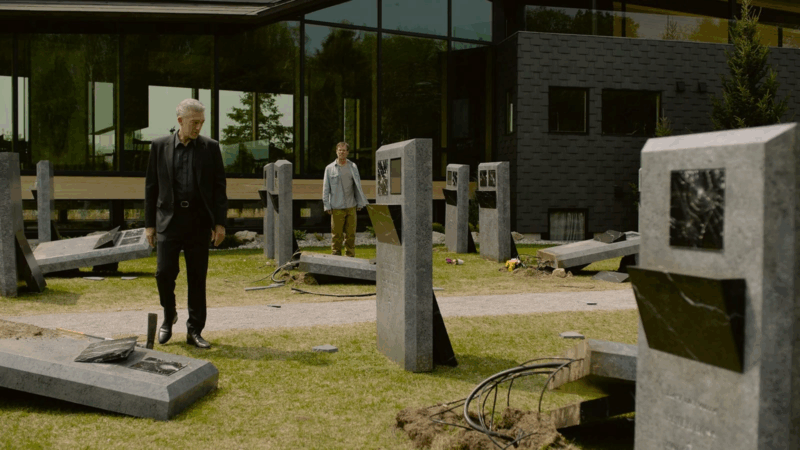‘The Shrouds’ introduces a new stage of grief: Watching your loved one decompose
When The Shrouds premiered at film festivals last year, David Cronenberg described it as his most personal work — a deeply felt response to the death of his longtime wife, from cancer in 2017. The movie is about a man named Karsh, who lost his wife, Rebecca, to cancer four years earlier.
That’s not the only similarity. If you know what Cronenberg looks like, you’ll see that Karsh, played by Vincent Cassel with a silvery shock of hair, resembles the director — maybe not a dead ringer, but close enough to give you a chill — and a bit of a chuckle.
That’s the thing about The Shrouds; it’s deeply morbid and sad, but it’s also disarmingly funny. Karsh is the mastermind behind a company called GraveTech, which allows people to monitor the remains of their dead loved ones.
Before the body is buried, it’s wrapped in a high-tech metal shroud, equipped with an MRI-style scanner. And so, at any time, with a swipe of your phone, you can watch a feed, from the grave, of the decomposing body. It’s not just on your phone, either; the feed also goes to a screen built into the person’s headstone.
Karsh himself uses GraveTech obsessively, keeping close tabs on his wife Becca’s body at all times. This has naturally made it difficult for him to move on. One amusing early scene finds Karsh on a blind date with a woman who heads for the exit the minute she finds out what he does for a living. The next day, Karsh debriefs the date with Becca’s sister, Terry, played by Diane Kruger.
Cronenberg is often described as a master of body horror, a subgenre he helped pioneer with early efforts like The Brood and Scanners and recently pushed to audacious new extremes with the wondrously icky Crimes of the Future.
The label can be misleading, though. Cronenberg’s films are even more cerebral than they are visceral, and he’s never been purely interested in grotesque for grotesque’s sake. The Shrouds is certainly a body-horror movie in perhaps the most relatable sense: It’s about the physical ravages of illness and death. At various points, Karsh sees Becca — also played by Kruger — in dreamlike flashbacks that reveal exactly what the cancer did to her body. I can’t think of a filmmaker besides Cronenberg who could present the body this way: with clinical directness, undimmed desire and real tenderness.
The Shrouds isn’t just a horror movie about corporeal decay; it’s a thriller steeped in techno-paranoia.
Early on in the film, someone vandalizes the GraveTech cemetery, ripping the headstones from their foundations and hacking into the video feeds, for reasons unknown. The Shrouds isn’t just a horror movie about corporeal decay; it’s a thriller steeped in techno-paranoia.
To get to the bottom of the vandalism, Karsh enlists the help of Terry’s ex-husband, a computer whiz played by an unnervingly twitchy Guy Pearce. Karsh also relies on an AI personal assistant — voiced by, you guessed it, Kruger again — who doesn’t seem entirely trustworthy. There are whispers that the vandals are aligned with shadowy Russian and/or Chinese forces, hinting at a mass data-theft conspiracy that may or may not exist.
The Shrouds never fully coheres as a mystery; in the end, it’s an intriguing but not especially satisfying puzzle. I didn’t mind that about it; Cronenberg isn’t out to provide easy answers. He’s saying that we live in such a 24/7 internet fog now, who knows what could be out there, mining the most human and vulnerable parts of ourselves: our habits, our yearnings, our relationships. This isn’t a new theme for Cronenberg; he’s always been fascinated by the way technology alters our minds and even our bodies.
In his 1983 classic Videodrome, the director inserted a Betamax cassette into his protagonist’s torso, literalizing the idea of what TV is doing to us. The Shrouds isn’t nearly as graphic, but it doesn’t have to be; it’s set in a world where most of us have all but fused with our phones already. All of which is to say that this seemingly death-obsessed movie — about grief and desire, and the unsettling power of technology to assuage them — is also a movie about life and the way more than a few of us live now.
FCC calls for more ‘patriotic, pro-America’ programming in runup to 250th anniversary
The "Pledge America Campaign" urges broadcasters to focus on programming that highlights "the historic accomplishments of this great nation from our founding through the Trump Administration today."
NASA’s Artemis II lunar mission may not launch in March after all
NASA says an "interrupted flow" of helium to the rocket system could require a rollback to the Vehicle Assembly Building. If it happens, NASA says the launch to the moon would be delayed until April.
Mississippi health system shuts down clinics statewide after ransomware attack
The attack was launched on Thursday and prompted hospital officials to close all of its 35 clinics across the state.
Blizzard conditions and high winds forecast for NYC, East coast
The winter storm is expected to bring blizzard conditions and possibly up to 2 feet of snow in New York City.
Norway’s Johannes Klæbo is new Winter Olympics king
Johannes Klaebo won all six cross-country skiing events at this year's Winter Olympics, the surpassing Eric Heiden's five golds in 1980.
Willie Colón, salsa pioneer, has died at 75
The South Bronx bandleader took the Latin genre to new heights while recording for Fania Records.






